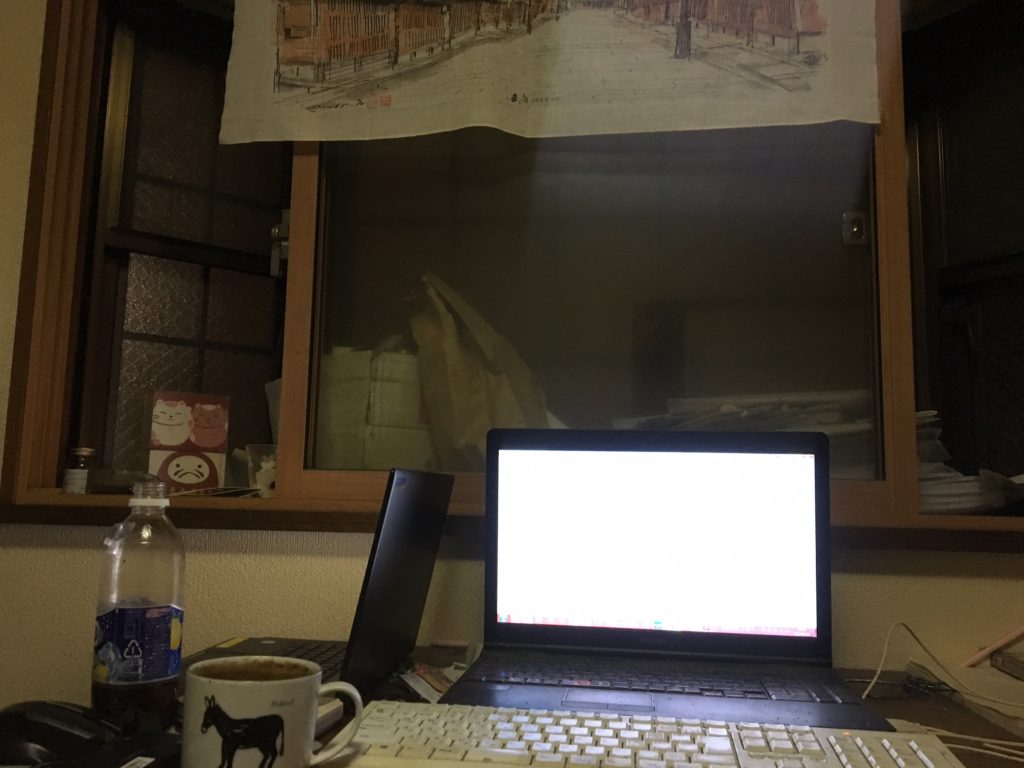Allow me to continue with my conversation about becoming a translator in Japan. You can find the first article, part one of this series here.
Freelance or In-house: Which to do First?
Well, in my own personal experience, translation is a field where you need to show people you have experience before being hired, but you need to have experience to get hired.
Back in 2010 and 2011 when I was trying to become a translator, this was a brick wall I smacked into many times. On paper, I had JLPT 1, but I had no formal work experience, so I could not get hired for translation work. Now, I do freelance patent work, advertising work, and legal work, but I have the formal experience of working in-house at a large Japanese patent law firm for seven years, so my gut tells me this is pretty useful in securing freelance work.
Getting your foot in the door is difficult, but once you do, my advice is to stick to it for three years because, from the experience of applying for jobs, three years of professional experience is usually required for freelance work.
Also, as mentioned previously, being “capable” of translation work and being “experienced” at translation work are two very different things, so I think joining a company and really honing your craft is a good idea before diving into the field of freelance translation.
With freelance, you are expected to be an absolute expert: there is no checking, there is no feedback (other than negative feedback), and this is very deadline-heavy work. If you do not have confidence in your translation abilities, I would not recommend diving into the field of freelance translation.
In addition, freelance translation has certain benefits but also has certain drawbacks when compared with in-house translation. Freelance translation, if you’re good at it, is great because you have total freedom in how much you work and when you work, and you don’t have to deal with the headaches concomitant to being a normal salaryman (e.g. getting up early, dealing with rush-hour train commutes, meetings, company politics etc.). But also, you will have to deal with the tax office all on your lonesome, and this work has no long-term security, so you had better be very confident in your abilities before you dive into this field (for what’s it’s worth, I’m STILL not that confident, so to keep my eggs in many baskets, I’m a seishain (full-time employee) of a patent law firm while supplementing my income by doing freelance stuff).
The freedom that comes with freelance work is great, but the amount of experience needed to get this freedom and the corresponding instability are considerable. Please keep these points in mind.
A final point to keep in mind is the convenience and comfort that come with being a company man: your company enrols you in the social security system, and takes care of all your tax obligations (by which I mean, the company takes the amount of your paycheck and you do not have to deal with the tax people at all). If you go full freelance, then you will find yourself collecting receipts, filing tax forms, going down to the tax office and city hall to fill out a hell of a lot of paperwork and, further when you go about trying to get permanent residency (I finally did this last month), NOT BEING a company man can prejudice the immigration people against you, because as a freelancer, you are viewed (perhaps somewhat unfairly) as being unreliable or a fiscal risk.
Working Remotely
Technology is great. I work full-time for a patent law firm, I do freelance patent translations for a separate translation company, I do advertising translation for an advertising firm, I write these articles, and I occasionally do divorce translations ALL FROM HOME.
It is now possible with technology to do such work not just from home but from anywhere in the world. Working from home is very convenient, but before I romanticize this too much, allow me to offer a few warnings concerning working from home. I’ve been working from home for two years now, and now, I am very used to it, and it allows me to tackle a lot of freelance work in addition to my actual work. However, working from home takes time to get used to. In the first six months or so, I worked from home, (1) I had trouble focusing on my work because I would invariably grab a book or mess around on the internet, (2) I became VERY LONELY because I’m single and live by myself, so I would go three or four days without actually speaking to another human being. No human is an island, as they say, but when you are completely isolated from other people, you will notice very quickly how true this is; I found myself talking to myself, whenever I had an opportunity to talk to someone, I would become verbose beyond belief, and I think I might have had a mild case of depression.
Anyway, working completely from home until you get used to it is a bit more taxing than you might think. Also, (3) in the winter and summer, when you will be using your heater and air conditioner around the clock, prepare yourself for a HUGE hike in your heating bill, and (4) this is perhaps a reflection of my personality more than anything, but I have really let my appearance go, because I don’t have to go to an office, my clothes are ragged, my hair is so long that I sometimes set it on fire by accident with lit cigarettes, I never shave (and I smoke WAY TOO MUCH because I’m at home). Anyway, most people have never worked completely from home, so I think many people have a somewhat romanticized view of this kind of work. I’m used to it now, and it really helps me, but it took me a good year to really get used to it. Please keep these points in mind.
The Future of Translation
I started translating professionally seven years ago, in December 2011. On my first day at the patent law firm, one of the patent attorneys said to me, with a little too much glee, “Your days are numbered because AI and machine translations are going to take your job.” This was an inauspicious start for me. Well, they’ve been talking about AI and machine translations taking over translation work for decades. I tend to be on the pessimistic side concerning AI, quantum computing, and the inevitable replacement of us humans with super smart computers. Insofar as I work in the patent field, I have learned that you SHOULD NEVER bet against technology. The question is not “if” but “when.” Here, the experts diverge widely, with some predicting the ascent of AI within the next five years and with others saying it will happen towards the end of this century. I don’t know. One of the problems machine translations have currently is that, as far as I understand it, machine translations are essentially chokuyakus (literal translations). Let’s look at two examples using Google translation, which I think is a pretty good gauge of the current state of machine translations.
Technical Translation from Google Sensei
(進歩性)この出願の下記の請求項に係る発明は、その出願前に日本国内又は外国において、頒布された下記の刊行物に記載された発明又は電気通信回線を通じて公衆に利用可能となった発明に基いて、その出願前にその発明の属する技術の分野における通常の知識を有する者が容易に発明をすることができたものであるから、特許法第29条第2項の規定により特許を受けることができない。
(Inventive Step) The invention, according to the following claims of this application, has become available to the public through inventions or telecommunication lines described in the following publications distributed in Japan or abroad prior to the filing thereof. According to the invention, before the application thereof, a person having ordinary knowledge in the field of the invention to which the invention belongs could easily have invented the invention. Therefore, according to the provisions of Article 29, paragraph 2 of the Patent Act, a patent I can not receive.
The bold parts jump out at me, but this actually isn’t a terrible job. Google translation actually has an easier job with very technical translations, because many technical translations can be literally translated, and that’s what google translation does best. However, when you get to normal, colloquial Japanese, google translation has a very hard time. Let’s have a look. Here is a blog entry concerning a novel that I am currently reading.
Novel Translation from Google Sensei
お話は簡単に書いちゃうと、
競馬場でたまたま知り合った、今の世の中に不満を持つメンバーが犯人集団となり、何か起こしてやろうということになる。このメンバーの中には刑事もいる。日之出ビールに恨みを持つものもいる。
日之出ビールの社長を誘拐し、レディージョーカーと名乗って脅迫する。社長を解放するときに、裏取引を持ちかけ、
警察との攻防(異物混入ビール)とは別に日之出ビールを追い詰めていく。
裏取引で大金をせしめる犯人グループだが、そこに、総会屋やその裏にいる政治家が絡んでくる。
さらに犯人グループにも亀裂が生じ、総会屋に付け込まれていく。
日之出ビール社長を警護していた刑事は、犯人グループにいる刑事を割りだし執拗に追いかける。
また、新聞記者や検察の検事も、事件そのもの、またその裏にいる政財界まで暴こうと追い続ける
As I write the story easily,
A member who happens to know at the racecourse happens to be a group of criminals who are dissatisfied with the current world and to do something. There are also detectives in this member. Some have a grudge against the Hinode Beer.
Kidnapping the president of Hinode Mihara, intimidating himself as Lady Joker. When releasing the president, we asked the back trade,
Apart from the battle with the police (foreign beer mixed beer), I will pursue Hinode Beer.
It is a criminal group that places a lot of money in the back deal, but there are politicians involved in the general assembly and its backs involved.
In addition, the criminal group also cracks, and it gets attached to the general assembly shop.
A criminal who had guarded the president of Hinode Miyuki beer divorced the criminal who is in the criminal group and persistently follows.
Also, prosecutors of newspaper reporters and prosecutors keep on chasing to uncover the incident itself, and the political and financial affairs behind it.
As you can see, this is essentially worthless as a translation, as the intended meaning itself is not clear (the ultimate purpose of translation is the conveyance of information, so even with mistakes and awkward sentences, as long as the correct information is conveyed, then you have been successful; this “translation” does not even convey information well).
Conclusion on Becoming a Translator
In conclusion, becoming a translator is difficult, but it is not impossible. There are many different fields of translation, and I think you should try to enter a field you are interested in and have a lot of knowledge in. The level of remuneration differs depending on the field. With technological advances, working remotely has become possible, but also, with technological advances, the future of translation itself is questionable. I hope this provides you with some advice on becoming a translator in Japan.
Read part one here.
Would you like to work in Japan?
Well, let Guidable Jobs help you! Just click here and apply for job!
Of course, you may search for more job information on Guidable Jobs.








![Regular Procedures for Foreigners Entering Japan [Part.2]](https://guidable.co/wp-content/uploads/2016/07/スクリーンショット-2016-07-24-14.35.43-750x450.png)

